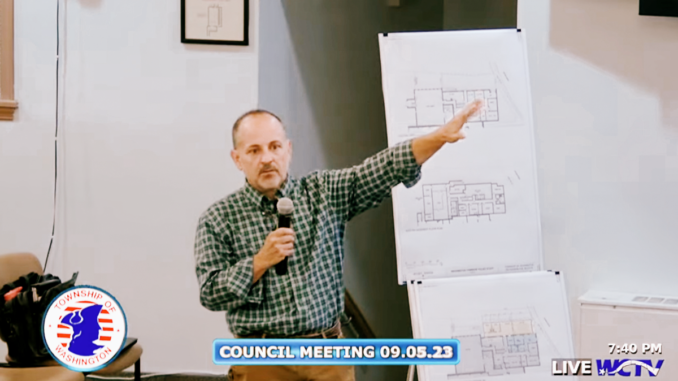
TOWNSHIP OF WASHINGTON—The township’s consulting architect presented three new options for upgrading the police department facilities Sept. 5.
Options range from approximately $1.5 million, to expand onsite space, to more than $7 million to shift council chambers to the proposed new DPW facility and allow police operations to take over space now used by the council chambers.
The architect said by shifting the council chambers from its town hall space to the new DPW facility’s second floor, and keeping some DPW offices at town hall, all required police department upgrades could be accomplished at the town hall.
However, that project’s total price tag was slightly over $7.6 million. The estimated new DPW facility cost, before adding council chambers, was nearly $5 million, said Anthony Iovino, of Arcari Iovino Architects, Little Ferry.
Iovino showed the three options to the council during a 20-minute presentation Sept. 5.
Iovino said the revised DPW price, which included adding the council chambers, and repurposing council chambers for police operations, increased the DPW project cost by approximately $2.6 million. The council didn’t ask Iovino any questions on this in open session, and took no action on the presentation. Township administrator Mark DiCarlo told us he anticipates discussion at the Sept. 18 meeting of the governing body.
Previously, some members including Tom Sears and vice president Steven Cascio, had questioned Iovino about why he offered designs that combined the police facilities with possible future new DPW facilities.
Sears previously questioned why bid specifications for the DPW facility were being held up pending a council decision on upgraded and expanded police department facilities.
Mayor Peter Calamari urged the council to wait until Arcari Iovino had presented additional options for police department upgrades before moving forward on the new DPW complex.
Architect’s New P.D. Options
Arcari Iovino presented two design options, Option 1 and Option 2, focused on improving and expanding on-site police department space at the town hall. Option 3 focused on the police department taking over council chambers space, and moving the chambers/courtroom space to the second floor of the new DPW facility.
Option 1, estimated at $1,417,747, offers ground floor expansion for prisoner handling and new office space. This also includes interior renovations on the main floor to achieve state Department of Corrections’ required spaces, ADA restrooms and clearances. Also, interior renovations of the lower floor for displaced office space.
Option 2, estimated at $1,004,708, offers ground floor expansion for prisoner handling and relocated offices to the lower level. This includes interior renovations to the main floor to achieve state DOC-required spaces, ADA restrooms and clearances. Also, renovations of lower floor former cells and processing area for displaced office spaces.
Option 3, estimated to add $2.6 million to new DPW facility’s estimate of $5 million, for a total $7.6 million cost, offers ground floor expansion for prisoner handling space, and police department use of council chambers’ space. It includes interior renovations on main floor to achieve state DOC-required spaces, ADA restrooms and clearances, minimal renovation of lower floor for police storage, and a takeover of council chambers for police department use.
Arcari Iovino suggested two possible options for relocating the council chambers’ space. One was to combine the council chambers with the current seniors’ space; the second option was to move council chambers to the new DPW complex’s second floor.
The architect noted combining council chambers and seniors’ space “is viable but would cause scheduling and territorial issues.” Also, the furnishings needed would require set up and break down for a range of events.
Meanwhile, the architect said the current DPW building plan utilizes only two-thirds of the new facility’s second floor, noting the council chambers and its support spaces can fit on the second floor, while keeping some DPW office space at town hall.
Answering council questions, Iovino estimated that Option 1 would take approximately nine months to complete once renovations began and Option 2 would likely be about six months to complete once construction had begun.
Iovino said Option 3 would be the “least disruptive” to police operations but that the new DPW complex might be complete by late 2024 and then police/council renovations could possibly be completed by mid-2025.
“Keep in mind that other project costs will apply, such as furniture, professional fees for architecture and engineering, and any other improvements planned for the property. As more information is developed for this site and project, we can offer a more refined opinion of the probable construction value. Please treat this opinion as preliminary,” concludes the proposal.
